The shared reaction of Chimacum Elementary School students Dec. 14 to an invitation to touch a collection of scaly reptiles was the same as any kid’s response would be: tentative poking, followed …
This item is available in full to subscribers.
We have recently launched a new and improved website. To continue reading, you will need to either log into your subscriber account, or purchase a new subscription.
If you had an active account on our previous website, then you have an account here. Simply reset your password to regain access to your account.
If you did not have an account on our previous website, but are a current print subscriber, click here to set up your website account.
Otherwise, click here to view your options for subscribing.
* Having trouble? Call our circulation department at 360-385-2900, or email our support.
Please log in to continue |
|
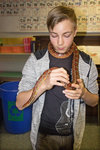
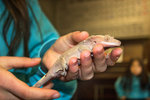
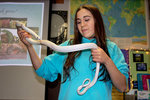
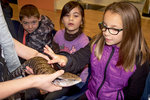
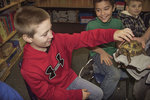
The shared reaction of Chimacum Elementary School students Dec. 14 to an invitation to touch a collection of scaly reptiles was the same as any kid’s response would be: tentative poking, followed by quickly withdrawing their hands and saying, “Ewwww,” before grinning, giggling and asking if they could touch the critters again.
Kit Pennell’s fourth-grade class was joined by Thaddeus Jurczynski’s Pi Elementary students that morning, as Lizardopolis folks – Port Townsend High School senior Lauren Taracka, assisted by her mother, Heather, and her friend Ephraim Lewis – held out each animal for gentle touching by the students.
COUNTERING REPTILES’ BAD RAP
The kids encountered Australian tree frogs, leopard and crested geckos, Russian tortoises, blue-tongued skinks and an assortment of snakes firsthand, as Taracka explained the traits of each species, as well as how many of them benefit the environment and humankind alike.
“Snakes eat meat, including rats and mice,” Taracka said. “By eating rodents, snakes help prevent the spread of diseases that rodents carry, like the black plague, which still exists. Those rats and mice also eat our food. Snakes are a natural rodent control.”
Taracka emphasized that, contrary to popular portrayals of snakes as aggressive and lethal attackers, they prefer to avoid contact with people, and only strike when they feel threatened.
“If you see a snake, just give it some space and back away, calmly and slowly,” Taracka said. “If they’re sitting on a path, they’re not waiting to attack you. The ground is probably warmer there. Snakes would rather hide than fight.”
Even venomous snake bites are rarely fatal; Taracka cited statistics indicating that only six people die out of the 7,000 who are bitten by snakes each year, compared to the 38 people who die out of the 4.5 million who are bitten by dogs each year.
“Reptiles, in general, get a bad rap,” Taracka said. “We’re not inclined to protect animals if we don’t understand them. By bringing these creatures face to face with kids, it helps them get over their fears and misconceptions.”
Taracka was a fifth-grade student, only a year older than the Chimacum students, when she first saw Scott Petersen, the “Reptile Man” of Monroe. Petersen inspired her to explore possible careers as a veterinarian or an entomologist.
By the time Taracka graduates from PTHS, she’ll also have completed her associate’s degree at Peninsula College, and plans to study ecology and evolutionary biology at Central Washington University, which even has a rattlesnake program.
“Beyond just snakes, amphibians are dying out,” said Taracka, who told the students how fragile her Australian tree frog is, because like all amphibians, it drinks water through its skin. “Between loss of habitat and toxins in their water and food, they’re vanishing silently, even though they’re essential to the world.”
SUPPORTING LOCAL YOUNG SCIENTISTS
Pennell, who arranged the visit from Lizardopolis, already knew the Taracka family, and she and Jurczynski integrated their presentation into their students’ December curriculum.
“We did a research project where we studied the biology of reptiles, including their scientific nomenclature, habitats, life spans, and physical and behavioral adaptations,” Pennell said. “I’ve hired Lauren to present Lizardopolis in the past, and I really want to support her scientific knowledge and educational vision.”
The Lizardopolis presentation packed a wealth of information into its running time of less than an hour, not only covering the biological needs of reptiles and how to respond when meeting them in the wild, but also imparting Taracka’s message of respect for all life forms, including animals in captivity, along with a plug for the local 4-H Reptile Club.
Pennell and Jurczynski agreed that their students responded positively to the material.
“Students are extremely engaged in the learning, and love sharing with their peers,” Pennell said. “Plus, Lauren has knowledge, experience and charisma, so it’s a pleasure to support local young scientists such as her.”